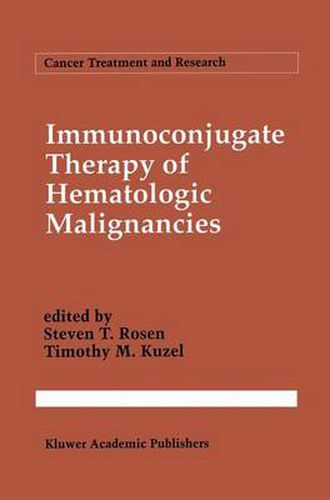Readings Newsletter
Become a Readings Member to make your shopping experience even easier.
Sign in or sign up for free!
You’re not far away from qualifying for FREE standard shipping within Australia
You’ve qualified for FREE standard shipping within Australia
The cart is loading…






This title is printed to order. This book may have been self-published. If so, we cannot guarantee the quality of the content. In the main most books will have gone through the editing process however some may not. We therefore suggest that you be aware of this before ordering this book. If in doubt check either the author or publisher’s details as we are unable to accept any returns unless they are faulty. Please contact us if you have any questions.
The hybridoma technique for producing monoclonal antibodies developed by Drs. Kohler and Millstein in 1975 revolutionized the field of tumor immunology. It is now clear that there are antigens associated with or restricted to human neoplasms that have biologic significance. Monoclonal antibodies have already been demonstrated to have great immunodiagnostic value, and it is anticipated that they will become a component of our therapeutic armamentarium. Most investigators in the field, however, feel the true potential of monoclonal antibodies in cancer therapy remains to be determined. Clearly the most encouraging results have been witnessed in the treatment of hematologic malignancies. This volume of Cancer Treatment and Research explores the current state of the art of immunoconjugate therapy of hematologic malignancies. The first chapter, authored by Drs. Rosen and Kuzel, reviews the current status of radioimmunotherapy of lymphoma. Results of clinical investigations utilizing radiolabeled immunoconjugates in B-cell lymphomas, T-cell lym- phomas, and Hodgkin’s disease are discussed. In addition, obstacles to effective antibody therapy are highlighted and toxicities are summarized. Chapter 2, written by Drs. Sgouros and Scheinberg, critiques the treat- ment of leukemia with radiolabeled monoclonal antibodies. In this chapter, the unique features of leukemia that make it particularly suitable for radio- immunotherapy are discussed, an overview of selected clinical trials is presented, and a treatment planning approach to radioimmunotherapy in- corporating biologic and physical parameters is reviewed.
$9.00 standard shipping within Australia
FREE standard shipping within Australia for orders over $100.00
Express & International shipping calculated at checkout
This title is printed to order. This book may have been self-published. If so, we cannot guarantee the quality of the content. In the main most books will have gone through the editing process however some may not. We therefore suggest that you be aware of this before ordering this book. If in doubt check either the author or publisher’s details as we are unable to accept any returns unless they are faulty. Please contact us if you have any questions.
The hybridoma technique for producing monoclonal antibodies developed by Drs. Kohler and Millstein in 1975 revolutionized the field of tumor immunology. It is now clear that there are antigens associated with or restricted to human neoplasms that have biologic significance. Monoclonal antibodies have already been demonstrated to have great immunodiagnostic value, and it is anticipated that they will become a component of our therapeutic armamentarium. Most investigators in the field, however, feel the true potential of monoclonal antibodies in cancer therapy remains to be determined. Clearly the most encouraging results have been witnessed in the treatment of hematologic malignancies. This volume of Cancer Treatment and Research explores the current state of the art of immunoconjugate therapy of hematologic malignancies. The first chapter, authored by Drs. Rosen and Kuzel, reviews the current status of radioimmunotherapy of lymphoma. Results of clinical investigations utilizing radiolabeled immunoconjugates in B-cell lymphomas, T-cell lym- phomas, and Hodgkin’s disease are discussed. In addition, obstacles to effective antibody therapy are highlighted and toxicities are summarized. Chapter 2, written by Drs. Sgouros and Scheinberg, critiques the treat- ment of leukemia with radiolabeled monoclonal antibodies. In this chapter, the unique features of leukemia that make it particularly suitable for radio- immunotherapy are discussed, an overview of selected clinical trials is presented, and a treatment planning approach to radioimmunotherapy in- corporating biologic and physical parameters is reviewed.